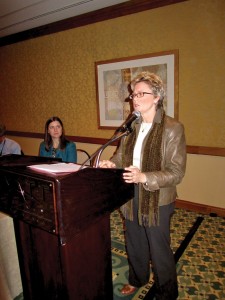LONG BEACH, CALIF. – AOPA Airport Support Network (ASN) volunteers met November 12, 2010 at the Hyatt Regency Hotel in Long Beach, Calif., during the AOPA Aviation Summit, to review accomplishments and issues requiring attention. The room was packed, obviously showing the importance pilots and aircraft owners place on protecting their airports through effective monitoring and involvement.
The Kings’ Incident

John and Martha King of King Ground Schools told ASN volunteers about their recent ordeal with the Santa Barbara, Calif. Police Department. Upon landing at the Santa Barbara Municipal Airport on August 28, 2010, the Kings were immediately arrested for allegedly stealing an aircraft. The 2009 Cessna 172 they were flying had registration numbers previously assigned to a 1968 Cessna 150 reported stolen and never recovered.
Following the incident, the Kings learned that once information is placed in the FBI database, it is next to impossible to remove it. When the Kings filed an instrument flight plan, a red flag went up and local law enforcement officials at Santa Barbara were notified by the El Paso Intelligence Center.
“The Santa Barbara Police were set up by the El Paso Intelligence Center,” said John King. “The police did what they were trained to do, but they do not have any training on how to intercept a real stolen aircraft,” said Martha King. “It was ineffective police work, but not their fault.” Instead of having ATC instruct the Kings to taxi towards a squadron of police cars away from the fixed base operation, the police should have allowed them to taxi to the ramp and arrest them when they exited the aircraft. “Had this been an actual theft, the criminals would have been tipped off and could have easily taken off from a taxiway or from the ramp,” said Martha King. “AOPA Airport Support Network volunteers should be the focal point to change this.”
Being the professional aviation educators they are, the Kings have developed an “Aircraft Interception Planning Guide” and “Checklist” for ASN volunteers to personally give to local law enforcement. This will demonstrate to local law enforcement that pilots are trying to police themselves, and therefore do not require more outside and undesirable intervention. For a free copy of the guide and checklist, go to www.johnandmartha.kingschools.com.
The Kings learned that arrests like theirs happen all the time, but they hope to change this with the help of the FAA. Eventually, it is hoped the FAA will not reassign aircraft registration numbers.
This incident earned the Kings AOPA’s Pilot’s Choice Award for Most Watched Video on AOPA Live for 2010.
FAA’s Top Administrator For Airports Catherine Lang

The Acting Associate Administrator for Airports for the FAA, Catherine M. Lang, briefed ASN volunteers on what the FAA is doing to protect general aviation airports.
“If you hear that a public-use airport is closing, let us know,” said Lang, who noted that the FAA will enforce grant assurances included with any federal funding of airport improvement projects.
Lang went on to discuss the FAA’s concern with bird strikes, and urged pilots to report incidents as they occur, no matter how minor.
Concerning the development of general aviation airports, Lang said that she is sick and tired of hearing media outlets reporting that the $1 billion spent each year on general aviation airports is coming from commercial airports, and not from general aviation airport users, because it is not true. “We have to set the record straight!” said Lang. The FAA is currently undertaking a study to correct this misperception created by the general media and public.
Lang went on to explain that the FAA has six categories of requirements for approximately 500 commercial airports to get federal funding, but only one category for all 2700 general aviation airports.
According to Lang, local pilots need to be telling their elected officials of the benefits of their local airport to the health and economic wellbeing of their community. Medivac helicopters and fixed-wing air ambulances, and the business the local airport brings to a community, need to be emphasized, she said.
First ASN Volunteer Recognized
Jim Gates of Torrance, Calif., the first ASN volunteer named in 1997, and the recipient of both AOPA’s Sharples and Crotti Awards for contributions to general aviation, received FAA’s “Master Pilot Award” at the meeting for completing 50 years of safe flying. Presenting the award was Kenneth Kelly, FAASTeam program manager for the Western-Pacific Region of the FAA.
Representing Clow International Airport in Bolingbrook, Illinois, at the meeting was ASN volunteer Grant Prellwitz and his wife, Leslie.
ASN Volunteer Numbers Increasing

In closing comments, Joey Colleran, AOPA Manager of State Legislative Affairs, announced that 74 new ASN volunteers have been recruited in November 2010 alone. There are now 2160 ASN volunteers nationwide.
ASN volunteers are the first line of defense in protecting GA airports. The second line of defense is local pilots and businesses that use the airport. The third line of defense is AOPA headquarters, which can only lend its support if AOPA is notified of local issues.
Pilots are urged to know who their local ASN volunteer is by checking the AOPA website: www.aopa.org/asn. Go to “Search For Volunteers,” and click “Find My Volunteer.” If your airport does not have an ASN volunteer, become one by contacting Joey Colleran at 301-695-2201 or email Joey.Colleran@aopa.org.